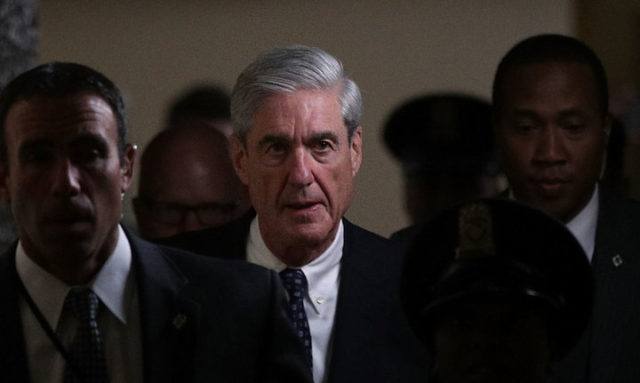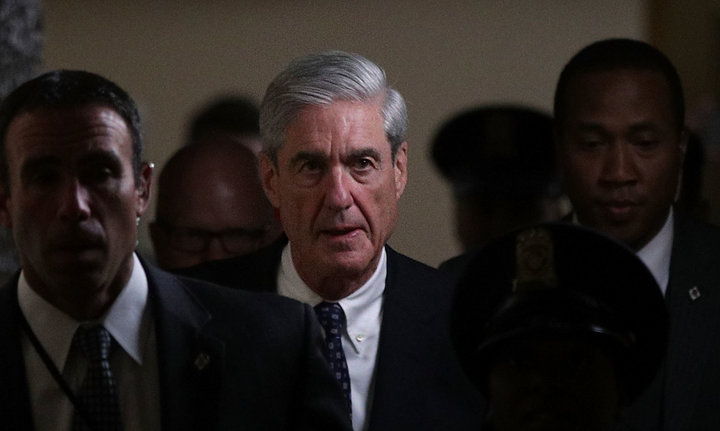

Special counsel Robert Mueller is methodically, brilliantly filling in pieces of a jigsaw puzzle. When complete, the puzzle will depict a president who is ripe ― overripe ― for impeachment.
Mueller’s indictment on Friday of Russia’s cyberwarfare against the 2016 election was a tactical and investigative masterstroke. President Donald Trump is now cornered. Mueller’s report makes a total liar out of Trump for his repeated claims that he believes Russian President Vladimir Putin when Putin says Russia had nothing to do with it, that the hacking could have been “some guy in New Jersey.”
The indictments do not quite connect the Russian operation to Putin personally, but that’s beside the point. No serious person believes that an operation as sensitive as deliberate disruption of the U.S. election could go forward without Putin’s full knowledge and support in a state as authoritarian as his.
Trump, having repeatedly denied Russian involvement, has now shifted gears and is insisting that the proper test of wrongdoing is “collusion.” But this is a straw man.
During the campaign, Trump repeatedly and publicly urged the Russians to come forward with dirt on Hillary Clinton. His top advisers met with Russian operatives to see what they had. That part of Mueller’s investigation is still open.
What we already know is plenty damning. A conspiracy of interest does not have to include an explicit tit-for-tat deal. It can be based on signaling.
In this case, Trump and his family relied on massive bailouts of his failing business enterprises from Russian oligarchs close to the Kremlin. When he became a presidential candidate, the Russians treated him as an asset ― a useful idiot, as Stalinists used to put it. And when the campaign finalists turned out to be Trump versus the hard-line Clinton, the Russians sought to destroy her and elect Trump. Trump, meanwhile, became the most pro-Russia president in U.S. history, refusing to breathe a word of criticism of Putin, behaving like the head of a client state. This much of the story is hidden in plain view.

The details ― of Russian financing of Trump’s businesses, and of more campaign contacts ― are likely to be spelled out in further indictments, almost surely including members of Trump’s family, and in Mueller’s final report, which will look very much like a bill of impeachment.
What’s astonishing ― and devastating ― is that this detailed report on Russian manipulation of a U.S. presidential election had to come from a special counsel. Under a normal administration, evidence of a foreign power meddling in a U.S. election would have prompted a presidential order for a full investigation. Instead, Trump mocked the whole idea and used his influence to block such inquiries by House and Senate panels.
Rather than looking deeply into Russian interference, the president appointed a commission on election integrity, headed by Vice President Mike Pence and Kris Kobach, the Kansas secretary of state best known for voter suppression, based on the premise that massive voter fraud by immigrants and others not qualified to vote had helped Clinton win the national popular vote. This was so preposterous that the commission collapsed of its own weight.
First, these disclosures end Trump’s intermittent efforts to fire Mueller. If he were to try that now, it would be an open-and-shut case of obstruction of justice. Congressional Republicans would have no choice but to begin the impeachment process.
Second, they drive a further wedge between Trump and the Republican leadership in the House and Senate. All key Republicans, whatever their marriage of convenience with Trump on other issues, have expressed outrage at the Russian operations and praised Mueller. Trump, by contrast, has only proclaimed his own lack of complicity, and has said nothing about what documented Russian interference means for American democracy, much less vowed to resist it and punish Putin.

We also see a further wedge between Trump and the entire intelligence community. Last week, on the eve of the Mueller indictments, the leaders of every major intelligence agency, including Trump appointees, testified unanimously before Congress that there was no doubt that Russia meddled in the 2016 election. Unlike Trump, they are alarmed that Putin tipped a U.S. election to a pro-Kremlin stooge.
One question is the degree to which Mueller’s 37-page indictment relied on materials from those U.S. intelligence agencies, and what else the government has that it isn’t revealing out of concern for disclosing “sources and methods.” Mueller’s indictment goes into far more detail than anything else that has been made public.
Two other questions remain. First is Mueller’s timing. When will other indictments come? He could wrap things up in a matter of weeks, or the investigation could drag out beyond November’s midterm elections.
Second is how the U.S. should punish and deter Russia. The Russian actions to undermine American democracy and tip the election amounted to an act of war. And if those actions were as effective as much reporting and now Mueller’s indictments have suggested they were, it means Trump literally became president in a Russia-sponsored coup d’etat.
The U.S. and the Russians surely have the capacity to knock out each other’s vital defense and infrastructure systems that rely on the internet. But unlike the nuclear deterrence of Mutually Assured Destruction, there are no bright lines when it comes to self-restraint in cyberwar. If there were, Russia surely crossed one in 2015 and 2016.
What sort of retaliation makes sense? Mutually assured cyberdestruction would be a catastrophe; that’s why Russia gets away with these incursions. But slaps on the wrist like banning the travel or freezing the bank accounts of a few Russian individuals just makes America look pitiful.
This is the serious question America needs to take up, once Trump is gone. Thanks to Mueller’s latest revelations and those still to come, that day may not be far off.
Robert Kuttner is co-editor of The American Prospect and a professor at Brandeis University’s Heller School. His forthcoming book is Can Democracy Survive Global Capitalism?
Courtesy: HUFFINGTON POST






